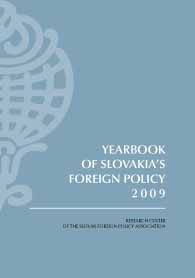The North Atlantic Alliance and Slovakia in 2009
The North Atlantic Alliance and Slovakia in 2009
Author(s): Matúš Korba
Subject(s): Politics, International relations/trade, Security and defense
Published by: Research Center of the Slovak Foreign Policy Association (RC SFPA)
Keywords: 2009; Slovakia; North Atlantic Alliance; perspective; NATO; politics; priorities;
Summary/Abstract: In 2009 the North Atlantic Alliance commemorated the 60th anniversary of its establishment. It celebrated its anniversary as historically the most successful and most efficient intergovernmental military and political organization. The list of NATO’s achievements in the four decades of the cold war era and in the two decades that followed round the turn of the century is very impressive. Against this, the realities of the present-day global security environment and the situation within the Euro-Atlantic space do not let the North Atlantic Alliance, already in existence for sixty years, have any rest. In the area of international relations in 2008 and 2009 there were several important events with direct impact on security and stability in Europe. In February 2008 most NATO Member States recognized Kosovo’s independence only then to witness the August 2008 recognition of Abkhazia’s and Southern Osetia’s independence by the Russian Federation. The change of Serbia’s state borders created a dangerous precedent that was subsequently exploited by the Russian Federation in its conflict with Georgia. The North Atlantic Alliance thus witnessed the first local war going on in its Eastern neighborhood. The violation of Serbia’s and Georgia’s territorial integrity due to recognition of their separatist regions’ independence contributed partly to increasing geo-political tension and became the beginning of a new stage of security relations in the old continent. The European security architecture is, due to this phenomenon, faced with yet another crucible and must in practice demonstrate the reason for its current ‘design’. The fundamental institutional element of this architecture is NATO, which in order to preserve security and stability in Europe, must respond to global influences and regional security threats and adapt as soon as possible to changing conditions. The level of security in Europe depends upon the efficiency of such an adaptation and any delay in doing so makes the old continent come back to a situation as unstable in political and security terms as that of the mid-90s of the previous century. The supreme political representatives of the Member States are well aware of the necessity to quickly and efficiently adapt the Alliance to the new situation and were throughout 2009 discussing the issues of the next stage of the Alliance’s transformation. Developments within NATO pressed individual Member States to join the transformation process and on the military level to continue the reforms of their armed forces. The question of how Slovakia went about the challenges is clarified in the pages below.
Book: Yearbook of Slovakia's Foreign Policy 2009
- Page Range: 35-51
- Page Count: 17
- Publication Year: 2010
- Language: English
- Content File-PDF

